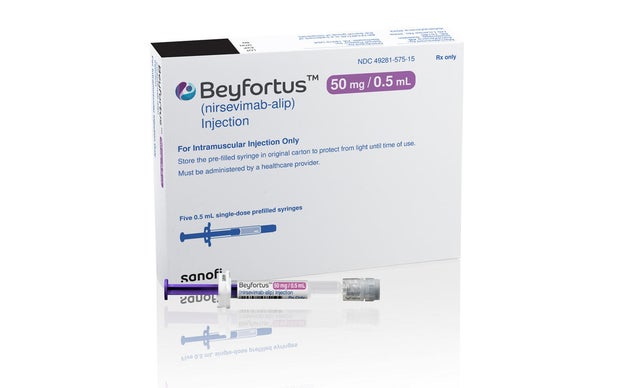The Food and Drug Administration announced Monday it had approved a new kind of immunization to protect babies from RSV, or respiratory syncytial virus. The drug, nirsevimab, is one of two new options doctors hope could soon prevent the leading cause of hospitalization facing American infants.
Outside advisers to the federal government have previously hailed nirsevimab’s showing in clinical trials as potentially “groundbreaking” for protecting babies. A panel of the FDA’s outside experts voted in June to back the drug’s safety and efficacy.
“Today’s approval addresses the great need for products to help reduce the impact of RSV disease on children, families and the health care system,” the FDA’s Dr. John Farley, director of the Office of Infectious Diseases in the FDA’s Center for Drug Evaluation and Research, said in a statement.
Drugmakers AstraZeneca and Sanofi, which will market nirsevimab under the brand name Beyfortus, have touted results showing an 83.2% reduction in hospitalizations from RSV infections after infants got their antibody injection.
“Today’s approval marks an unprecedented moment for protecting infant health in the U.S., following an RSV season that took a record toll on infants, their families, and the U.S. healthcare system,” Sanofi executive vice president Thomas Triomphe said in a statement.
AstraZeneca and Sanofi
Until recently, parents and doctors only had one option to shield some babies from RSV: monthly injections of palivizumab, an antibody drug which is recommended for use just in at-risk infants and young children.
Nirsevimab only requires one injection for the season, shielding infants from catching their first RSV infection until they are older with a single shot.
While virtually all children catch RSV by age 2, those who catch the virus within their first months of life are substantially more likely to be hospitalized, even if they do not have underlying medical conditions.
However, concerns over cost, as well as a competing option to protect babies that is also seeking the FDA’s approval – Pfizer’s Abrysvo vaccine, which is given during pregnancy – could limit how many babies end up getting nirsevimab.
The Centers for Disease Control and Prevention’s Advisory Committee on Immunization Practices have wrestled for months around drafting recommendations on how parents and doctors will navigate the two competing products.
“When considering whether to give both a maternal vaccine and a monoclonal antibody, giving both products was not found to be cost effective,” the CDC’s Christopher Jones told an ACIP meeting in June.
Instead, Jones said a work group of the committee’s advisers was weighing whether to limit the recommendations for using the drug to only babies of moms who had not gotten Pfizer’s vaccine, with only a handful of exceptions.
Next month that CDC panel is scheduled to meet again and formally vote on nirsevimab.
The vote will be a key step towards including the antibody drug in the federal Vaccines for Children program in order to cover the shots for uninsured babies, as well as triggering federal requirements governing what private insurers must cover.
A Sanofi spokesperson said the company plans to launch Beyfortus “in time for the 2023-2024 RSV season” and will share more information about the U.S. price of the drug by then.
“We expect Beyfortus to be priced similarly to an innovative pediatric vaccine series, in accordance with the value and innovation it delivers,” the spokesperson said.
The FDA and CDC previously signed off on the first new options to protect older adults from RSV, which include Pfizer’s Abrysvo vaccine. Abrysvo is expected to be “broadly available in about a month from now” for eligible Americans, a Pfizer spokesperson said.
Logistical hurdles
Nirsevimab’s coming rollout as a broadly recommended option for American babies has also posed a series of logistical hurdles for health authorities, whose immunization systems are largely designed for handling only traditional vaccines as opposed to antibody drugs.
“There are quite a lot of challenges that we are working through, and we will continue to work through, because we’ve got a product that sort of will function as a therapeutic and an immunizing agent at the same time,” the CDC’s Georgina Peacock told a Department of Health and Human Services meeting last month.
One hurdle health authorities have worked to plan out is how the safety of nirsevimab will be monitored between the FDA and CDC.
Reports of adverse events in babies after getting the injections will need to be routed through a separate system run by the FDA for drugs, which works differently from the databases and systems typically used to track vaccine side effects and any potential safety issues.
Some states also may not be able to include nirsevimab in their immunization registries, complicating efforts to track who has gotten the injection.
“There will be a robust monitoring process in place for nirsevimab to include CDC and FDA, and collaboration between the two agencies, to make sure that safety information or the data are analyzed,” the CDC’s Tom Shimabukuro said last month.

 Latest Breaking News Online News Portal
Latest Breaking News Online News Portal





